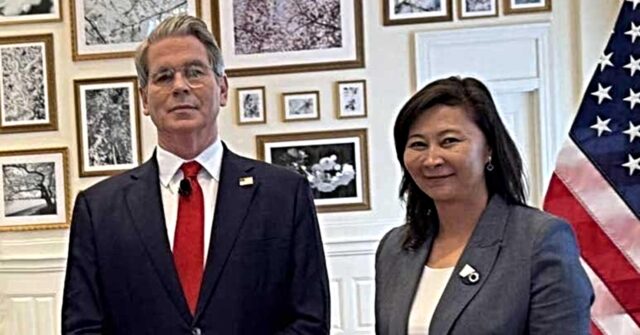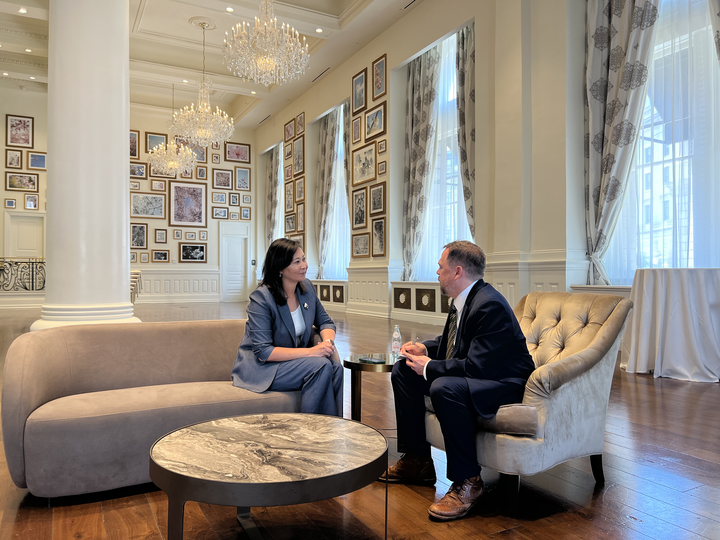Washington, D.C. –When Umut Abakirova graduated from the American University of Central Asia, she began her career as a loan officer. Two decades later, she is one of Central Asia’s most prominent women in finance: chief executive of Bakai Bank, one of the Kyrgyz Republic’s largest private lenders.
Her ambition is to turn Bakai into a gateway between Central Asia and the West, a partner for American companies and investors seeking exposure to an overlooked but resource-rich region. In an interview with Breitbart News, Abakirova made her case for why Washington should pay attention.
“We came here to represent our country, a little but very strong country, I would say, Kyrgyzstan,” she said. “We are growing very fast. And we are ready to be transparent and open for international cooperation.”
A Bank on the Rise
Bakai has expanded rapidly. It serves more than a million clients, doubled its loan portfolio in the past two years, and counts Coca-Cola, KFC, Hyatt Regency, and General Electric among its corporate customers. In 2025 it became an official partner of UFC CIS, boosting its brand visibility far beyond finance.
A Fitch Ratings report in June assigned Bakai a “B-” rating with a stable outlook, praising its profitability, deposit growth, and adequate capital buffers. The bank’s loan book grew at a 38 percent annual pace from 2022 through 2024, while deposits surged 64 percent.
Sanctions, Remittances, and China’s Shadow
Abakirova described a problem little discussed outside the region: remittances from Kyrgyz workers in Russia, who make up roughly one-third of the country’s labor force. Western sanctions on Moscow have made official transfers nearly impossible.
“Now this money is coming to our country by cash, or by crypto, or by Chinese yuan,” she said. “Honestly, we don’t like this growing influence of China.”
She warned that sanctions are unintentionally strengthening Beijing’s hand in Central Asia. “We are afraid of secondary sanctions,” Abakirova said. “But we need some assurance from the government of USA or OFAC to make these transfers officially.”
OFAC is the common abbreviation for the Office of Foreign Assets Control. It’s an office of the U.S. Department of the Treasury that administers and enforces economic and trade sanctions against targeted foreign countries, regimes, groups, and individuals.
The request, never before aired publicly, points to the delicate position of a small state wedged between Russia and China but seeking Western ties.
The dependency runs deeper than remittances. “We have no choice besides buying gas from Russia,” she said, explaining how sanctions policies are inadvertently pushing her country toward alternatives Washington would prefer to avoid. “That’s why we have come here.”
Banking Without American Banks
Despite its international outreach—audited by KPMG, deploying U.S.-made LexisNexis compliance systems, and publishing its first ESG report—Bakai still faces a basic barrier: no American bank has correspondent accounts in the Kyrgyz Republic, or even in Central Asia.
“That is also a problem for our region,” Abakirova said. “We are very transparent. But we need those relationships to connect.”
Her push is to persuade U.S. banks and regulators that Bakai is a credible counterparty—highlighting the bank’s Big Four audits, membership in Washington-based trade finance associations, and its designation as a systemically important bank at home.
Kyrgyz itself has been expanding at a brisk clip, with 9 percent GDP growth annually from 2022 through 2024, the highest in Central Asia. The government is building more renewable energy capacity, expanding railways, and tapping deposits of gold, lithium, and rare earths critical to global supply chains.
“We are more open. We are more democratic, in comparison with other countries, and we are more open for international institutions,” Abakirova said. Her pitch is that the country offers both strategic resources and political openness, making it a natural partner for the U.S.
“We want to be a gateway to Central Asia for America,” Abakirova said, saying this could make the region less dependent on Russia and China.
From Loan Officer to CEO
Abakirova’s personal trajectory mirrors her country’s ambitions. She rose from entry-level loan officer to CEO of Bakai after the bank acquired her employer. Now she oversees an institution with an 11 percent share of sector assets and a 12 percent share of deposits, growing fast but still looking for outside partners.
Her meetings in Washington this summer with Treasury Secretary Scott Bessent and executives from BlackRock and Bank of America were a first step.
Whether her calls for U.S. engagement are answered may determine if Bakai remains a domestic success—or becomes Central Asia’s bridge to the global financial system.



















